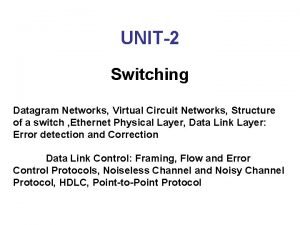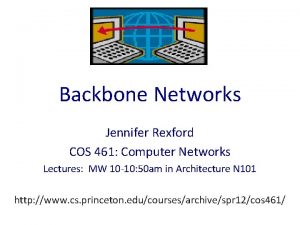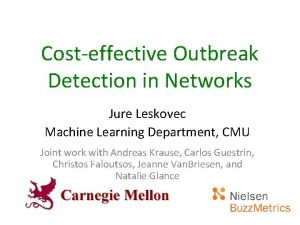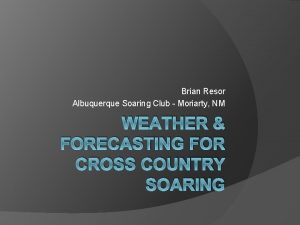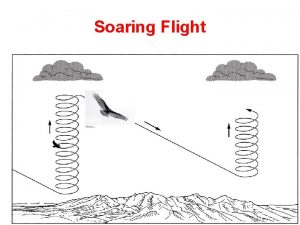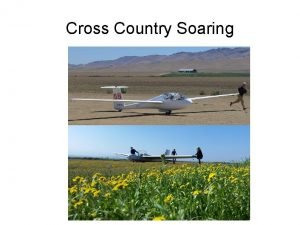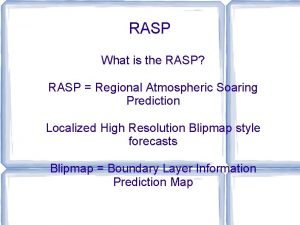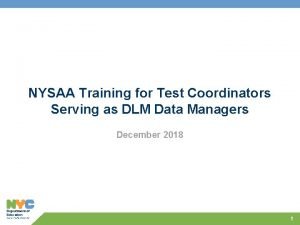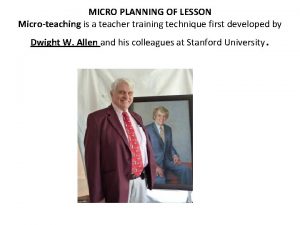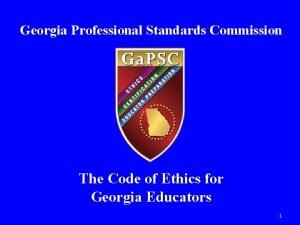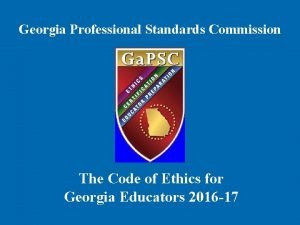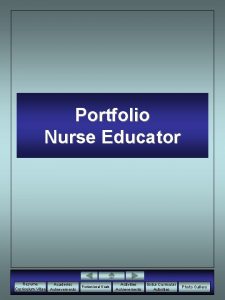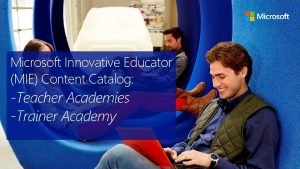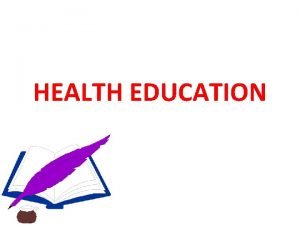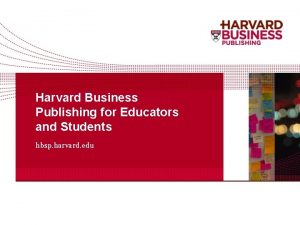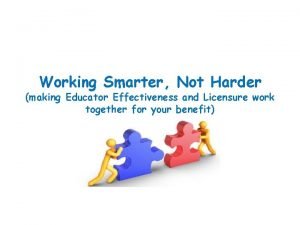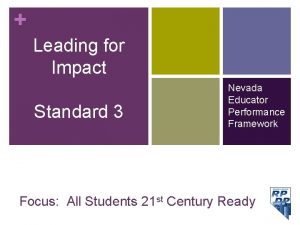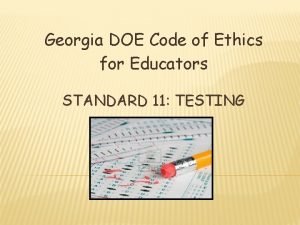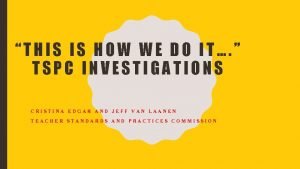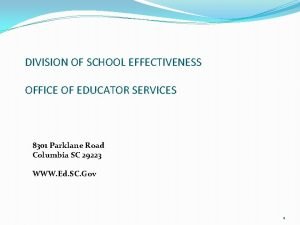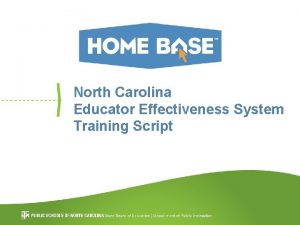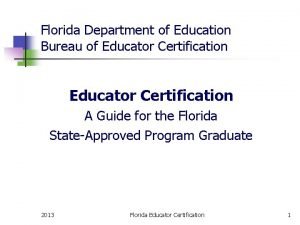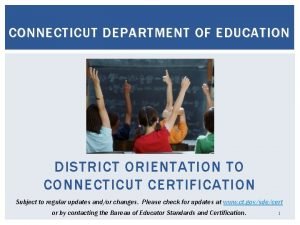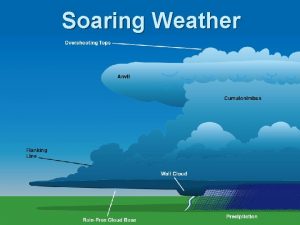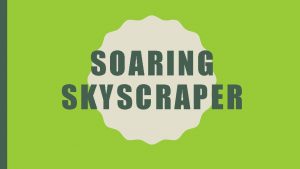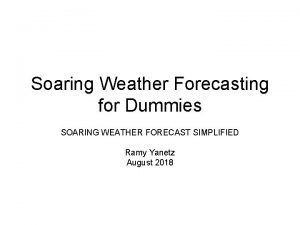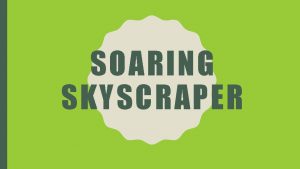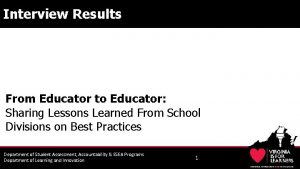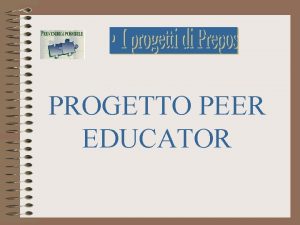Regional Educator Networks Soaring to New Heights EFFECTIVE







































- Slides: 39

Regional Educator Networks – Soaring to New Heights EFFECTIVE & SUSTAINED TEACHER LEARNING Naomi Norman, Interim Assistant Superintendent Washtenaw ISD and Livingston ESA Scott Menzel, Superintendent Washtenaw Intermediate School District www. miteacher. org/about-networks. html

Washtenaw and Livingston Counties in Southeastern Michigan 14 School Districts • Largest: Ann Arbor 17, 000 students • Smallest: Whitmore Lake 900 students Urban, Suburban and Rural 75, 000 students 5000 teachers

A quick question What is your greatest frustration related to professional development for teachers? www. miteacher. org/about-networks. html

What kind of teacher learning matters most?

Learning is a social activity. You learn from the company you keep. Smith, Frank, (1998). The Book of Learning and Forgetting. Teachers College Press. New York, NY. p 45.

Learning is self-determined. An outsider can never direct a living system to learn, they can only disturb and support it. P 9 Sessa, V. , & London, M. (2006). Continuous learning in organizations: Individual , group, and organizational perspectives. Lawrence Erlbaum Associates, Publishers. Mahwah, NJ.

Joyce and Showers Model Training Method How do we achieve it? Level of Impact Training Methods & Levels of Impact Joyce & Showers (1980) Evidence of Impact What does this look like? Didactic presentation of theory & concepts Awareness Participant can articulate general concept & identify problems. Modeling/demonstration (i. e. live, video) Conceptual Understanding Participant can articulate concepts clearly & describe appropriate actions. Knowing Practice in simulated situations with feedback (i. e. role play, written exercises Coaching & supervision during application Doing Skill Acquisition Participant can begin to use skills in structured or simulated situations. Application of Skills Participant can use skills flexibly in actual settings.

Regional System Levers Organizational Structures & Processes Groups of Teachers Teacher www. miteacher. org/about-networks. html

Regional Networks as a System Lever www. miteacher. org/about-networks. html

Right and Wrong Drivers of Reform Right Wrong Capacity building Individual teacher and leadership quality: promoting individual versus group solutions Group work Instruction Systemic solutions

How do we build it as a SYSTEM?

“Systemness” Each layer in the system considers one layer above them. Moving from MY learning to OUR learning. Instead of MY classroom it is OUR classrooms. MY school becomes OUR schools MY district becomes OUR region My county becomes OUR counties

Shared “Good Enough” Vision Every 5 years we revisit our focus for instructional improvement Key assumptions about shared vision and work: Every year we revisit the impact/value of each of our networks and determine level of resource support • Not all districts have to join all initiatives Each network is grounded in the same assumptions • Once we adopt a perspective, we don’t train in other competing approaches Theory of Action/logic model is articulated • If a teacher were to engage in ALL networks, the work would be consistent and aligned. In other words, every network is simply an entry point to a particular kind of high quality instruction. www. miteacher. org/about-networks. html • Initiative has to be relevant to all districts

Blueprint for Engaging Students in Literate Thinking in Washtenaw County Key Elements of Blueprint for Engaging Students in Literate Thinking County Approach to Adolescent Literacy System and Individual Capabilities that Support Effective Literacy Instruction Teacher Capabilities Utilizing a metacognitive model that builds agency and efficacy in students so they can fully access the curriculum. (Giving students the tools to be thinkers. ) Apprenticing students in discipline-specific reading, writing, and oral language instruction. Strengthen Instructional Capabilities ØConceptual understanding of importance of literate thinking ØDevelop skills and knowledge ØApplication of effective literacy -related instructional practices Form county cohort of trainers and team facilitators with content area focus using existing models such as • Reading Apprenticeship • Writing Apprenticeship • HI-Class • Critical Friends Groups Facilitator’s Network Strengthen Leadership and Collaboration Capabilities ØFacilitating change process ØCollaborative group techniques Support a cross-county network of literacy facilitators for training, collaboration, and leadership purposes. Leadership & Design Teams System Capabilities Building strong teacher collaborative processes. Framing ideas: ØCommon Expectations for literacy ØPersonalizing learning ØMultiple forms of assessment ØEffective instructional practices ØTeaming Hoped-for Outcomes Coordinated Professional Development Purposes Strengthening student, teacher and system capabilities to support the development of “literate thinkers”. Initiatives to Support Effective Literacy Instruction Align processes and procedures ØLeadership team ØAssessment processes ØTeacher collaboration ØLiteracy plans ØProfessional development ØCoordination of outside support Align infrastructure ØExtended time for literacy ØCreation of classroom libraries ØIntensive academic literacy class Focus leadership and design team model on supporting building leadership teams address literacy professional development needs. Leadership Support ØIncrease in student agency and thinking skills ØIncrease in student reading comprehension and writing skills ØDecrease in the gap between low performing students and others ØIncrease in teacher collaborative practices ØIncrease in cross-district collaboration ØAlignment of district, building and ISD literacy goals Support development of buildinglevel literacy teams Support building and district leadership Develop and maintain working relationships with community partners Adolescent Literacy Steering Committee, a subcommittee of the Effective Practices/Assessment Workgroup, Washtenaw County Intermediate School District, March 2006


Our networks and how they are organized

Design for Learning …there are few more urgent tasks than to design social infrastructures that foster learning. Wenger, E. (1998) Communities of Practice: Learning, meaning, and identity. p 225

Entry points for networks Student Learning Need Example: Poor literacy performance by 6 th-11 th grade students led to the Adolescent Literacy Networks County or regional instructional group decides if the topic/area warrants further investigation, forms a subcommittee to investigate, and if reasonable, recommends forming a network. System Coherence Example: New state policy on evaluation led to forming the Teacher Evaluation Network The Superintendents’ group officially approve the forming of a network and allocates the resources. . www. miteacher. org/about-networks. html Teacher Learning Need Example: Need for teachers to understand how to unpack the Common Core Standards led to Assessment Literacy Network Moral Imperative Example: Culture & Diversity

Life Cycle of a Network www. miteacher. org/about-networks. html

Engaging Students in ‘Literate Thinking’ Phase 1 Phase 2 County Form County-wide. Steering Committee ØArticulate vital components of effective literacy instruction and infrastructure ØDevelop and practice strong literacy, leadership and collaboration skils ØProvide training for building and district leadership teams Classroom School District ØDetermine county-wide implementation plan Form cross-district literacy team ØDevelop a shared vision ØArticulate vital components of district literacy work in terms of instruction and infrastructure Phase 4 Sustain County-wide Literacy Facilitator Network Develop County-wide Literacy Facilitator Group ØDevelop a shared vision Participate in County-streering committee Phase 3 ØProvide training and support across districts in literacy and teacher collaboration ØProvide support for building leaders and leadership teams Maintain c ross-district literacy team ØMonitor progress toward a coordinated literacy program within district ØReview data ØCoordinate literacy work across buildings with attention to transition years Participate in district literacy team Develop literacy facilitators and organize small learning teams ØTwo teachers attend summer training and ongoing training throughout year to become formal facilitators within building, district and county ØTeachers form a small, literacy leadership team within school and train team members in literacy and collaboration strategies Measurable change in instruction in literacy leaders’ classroom (2 classrooms) Provide school-wide training in literacy skills and provide learning teams with further skill development ØProvide formal literacy training for entire school staff ØForm additional small learning teams to focus on instructional strategies and assessments related to literacy Measurable change in instruction in the classrooms of the literacy team members (4 -6 classrooms)

LIFECYCLE OF A NETWORK 5 years Research & Development Forming Scaling Up Institutionalized Mathematical Practices Study of Early Literacy Writing Collaborative Reading Apprenticeship Cultural Proficiency Science Workgroup Adaptive Leadership Interdisciplinary Literacy Teacher Evaluation Network Assessment Literacy Instructional Consultation Teams Coordinated School Health www. miteacher. org/about-networks. html

NETWORKS OVER TIME Research & Development 2004 Reading Apprenticeship Writing Collaborative Interdisciplinary Literacy Adaptive Leadership Assessment Literacy Study of Early Literacy Science Workgroup Cultural & Diversity Task Force www. miteacher. org/about-networks. html Forming Scaling Up Institutionalized 2015

Coordinator Steering Committee Superordinate Group of Teacher Leaders Cohorts of Teachers www. miteacher. org/about-networks. html Cohorts of Teachers

Red line represents average expected growth for each grade level


Staffing and Resource Allocation ESA Level District level Approx. 5 FTE to lead/coordinate network Pay for cohort training sessions ($300 person, sometimes districts have to pay summer stipends to teachers also) Substitute teacher costs for core teacher leader group ($800 per teacher) Stipends for steering committee summer and after school work ($800 per steering committee member) Approx $70, 000 per year expense ($30, 000 in revenue) www. miteacher. org/about-networks. html Districts use PD time, common planning time to do work. Capacity to lead, train, support is all local Share teacher leaders with other districts for cohort training days

Literacy Networks Adolescent Literacy and Early Literacy

Michigan Reading Journal Article: The Study of Early Literacy: A Network Model for Teacher Professional Development. https: //drive. google. com/file/d/0 B 5 fd. FPQ 37 h. Dsb. EVa. QU 96 a. XBMYWs/view www. miteacher. org/about-networks. html

Inquiry Area – Early Literacy What early literacy instructional best practices help to produce literate, lifelong learners? www. miteacher. org/about-networks. html

Invite your core group of educators and commit to focused inquiry Classroom teachers, curriculum leaders, principals, literacy coaches. Tap community or university partners Start as you intend to continue (if you want all disciplines represented, make sure they are all there. If you want diversity in age, gender, race/ethnicity, make sure you have that representation) One to two years to read, study, learn about the instructional challenge and various approaches to addressing it. Involve researchers, experienced teachers, find places around the country that are doing great work. Identify core approach to take for the next 5 years. www. miteacher. org/about-networks. html

Pilot with a group of teachers and test your theory Action research Data collection and reporting Feedback and adjustment www. miteacher. org/about-networks. html

Define your approach and form your first group Approach this as the first group of instructional leaders, so the work is about the pedagogy as well as how to track progress, provide feedback to each other, and work with peers www. miteacher. org/about-networks. html

Build cohorts and use feedback Always work in cohorts or teams where teachers can build trust, relationships, and challenge one another over time Collect and use feedback. Know where teachers struggle and where they find success. Collect data because it is useful for teachers. Find a way to aggregate that data. Use the teacher leader group to determine how to face challenges. www. miteacher. org/about-networks. html

What lessons did we learn?

Unintended positive consequences Strong teacher leaders make good principals. These teachers are frequently selected formal leadership roles. Nearly all new principals that are selected from within our districts have been one of our network leaders. Networks are being recommended and led by local district leaders. Our team isn’t directly supporting all our networks. We don’t run into the challenge of offering a workshop and having no one attend. It is very collaborative and co-planned, so we know well ahead of time if there are challenges (ie with substitutes, staffing, leadership, etc. ) Our districts have aligned school and district improvement plans and asked if they could pay us for this work. Collecting data to the student level creates a high level of understanding of how the network is impacting student learning (where it works and where it doesn’t) We can offer simultaneous training in all districts on the same day. www. miteacher. org/about-networks. html

Negative Unintended consequences Negative Outcomes of Social Capital: ◦ ◦ Exclusion of outsiders Excess claims on group members Pressures for conformity Downward leveling norms Pressure to push weak instructional models through the strong network relationships P 206 Coburn, C. E. & Russell, J. L. (2008). District policy and teachers’ social networks. Educational Evaluation and Policy Analysis. September 2008. Vol 30 No. 3 pp 203 -235.

Final Thought

Stewardship not leadership “The alternative to leadership is stewardship. Stewardship asks each one of us to be responsible and accountable for the outcomes of the system we design. Stewardship is shared accountability, which is fueled by a shared commitment to service. …Stewardship transcends leadership. ” Banathy, B. H. (1996). Designing social systems in a changing world. New York, Plenum Press.

Questions?
 Dr jack soaring forecast
Dr jack soaring forecast Vc vs datagram
Vc vs datagram Backbone networks in computer networks
Backbone networks in computer networks Cost-effective outbreak detection in networks
Cost-effective outbreak detection in networks Strive for new heights
Strive for new heights Reno soaring forecast
Reno soaring forecast Moriarty nm weather
Moriarty nm weather Woodlands ring primary school
Woodlands ring primary school Andean condor speed
Andean condor speed Cross country soaring
Cross country soaring Caesar creek soaring club
Caesar creek soaring club Ridge soaring gliderport
Ridge soaring gliderport Rasp soaring
Rasp soaring Boulder soaring forecast
Boulder soaring forecast Williams soaring center
Williams soaring center Technical soaring
Technical soaring Colvestone primary school
Colvestone primary school Soaring safety foundation
Soaring safety foundation Soaring safety foundation
Soaring safety foundation Student.kiteaai
Student.kiteaai Sample of micro teaching lesson plan
Sample of micro teaching lesson plan Georgia professional standards
Georgia professional standards Georgia educator code of ethics
Georgia educator code of ethics Msde educator portal
Msde educator portal Nurse educator resume
Nurse educator resume Microsoft teacher academy
Microsoft teacher academy Health education meaning and definition
Health education meaning and definition Hbsp for educators
Hbsp for educators Aed t&l
Aed t&l Alabama teacher code of ethics
Alabama teacher code of ethics Ppg examples for educator effectiveness
Ppg examples for educator effectiveness Turing tumble educator guide
Turing tumble educator guide Nevada educator performance framework
Nevada educator performance framework Ga ethics exam
Ga ethics exam Tspc discipline
Tspc discipline Vumc educator portfolio
Vumc educator portfolio Office of educator services
Office of educator services Nc educator effectiveness system
Nc educator effectiveness system Bureau of education certification florida
Bureau of education certification florida Ct teacher certification lookup
Ct teacher certification lookup

